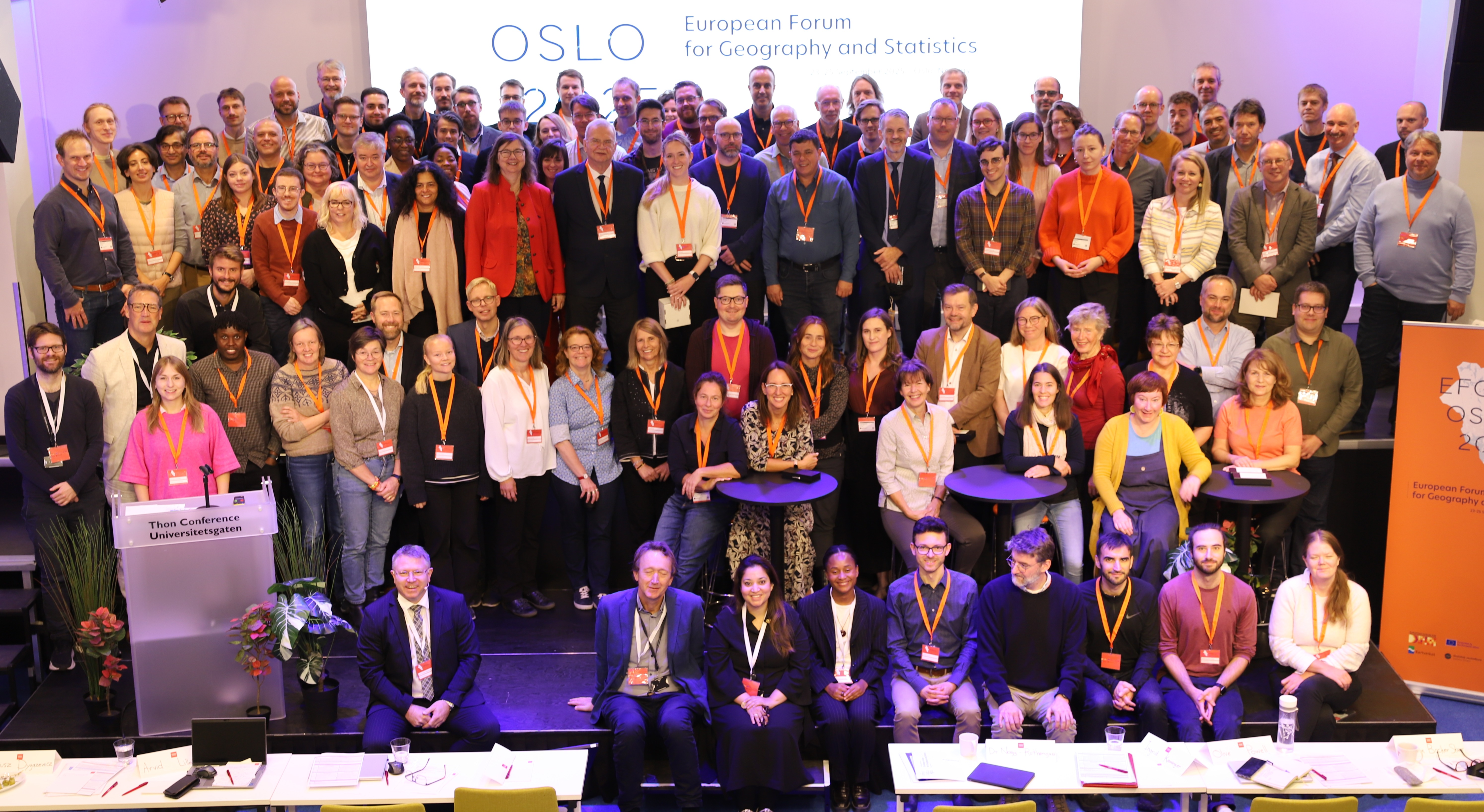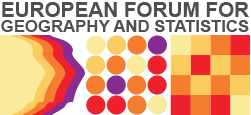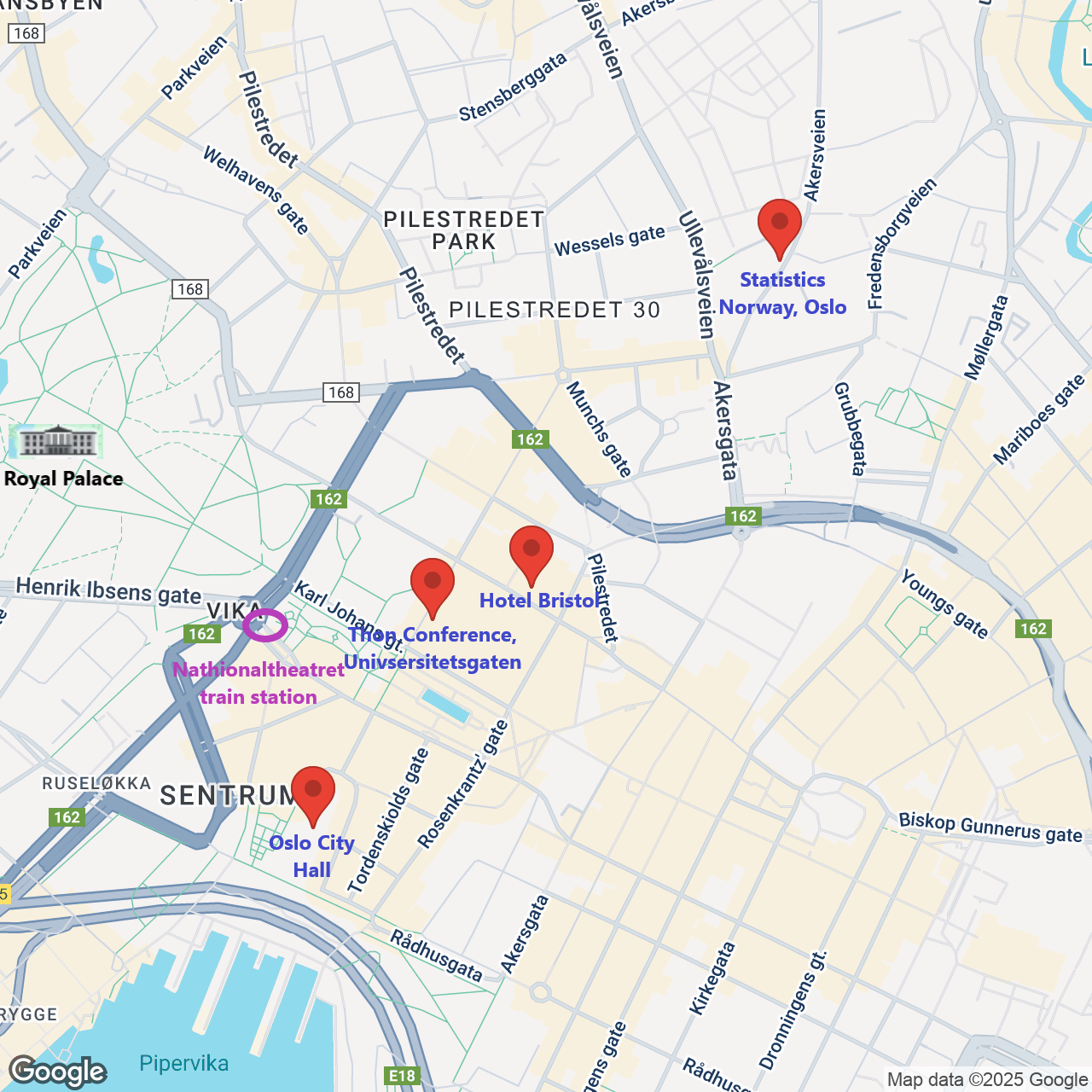
Information
Post conference information
- Photo gallery
- Links to video recordings of the main conference sessions (day/session) :
1/1 - Frameworks in Geospatial and Statistical Communities
2/1 - GIS Tools for Processing and Dissemination
2/2 - GSGF principles in action
2/3 - New Technologies - Automation
2/4 - Data Integration for Cross-border Work
____________________________________________________
The main event took place 24th – 25th September.
Pre-conference activities were on 23rd September. This is a day for workshops, demonstrations and training, with a reception at the Oslo City Hall in the evening.
"Trusted data, in a changing Europe" is this year's conference motto, reflecting the importance of delivering trustworthy and authoritative data and geostatistics for policy- and decisionmakers at all regional levels. One might argue - never more relevant. Geostatistical integration, Spatial Data Infrastructures, new technologies for geostatistical analysis are cornerstones in creating trustworthy data, and central session topics in this year's conference.
We hope many wish to participate in the choice of a 2- or 3-day program, meeting colleagues and exchanging know-how in both formal and informal settings. We will be located in Oslo city centre, close to many of its attractions, which we will draw upon for our conference dinner, and for other optional activities.
Call for nominations! The Lars H. Backer Prize 2025
More information about process of nomination and selection here.
Key dates:
28 May: Registration opens. Invitation and tentative conference topics available
8 July (extended): Deadline for submitting abstracts (maximum 40 lines)
11 July: Presenters notified of the acceptance of their proposals
22 August: Finalised conference programme
New! 4 September : Registration deadline
12 September: Deadline for presenters to submit presentations
Collaboration partners:
 |
 |
|||
Registration
Information
Registration deadline
The registration deadline has passed and you can no longer register. Please contact the organiser if you have any questions.
Trusted data in a changing Europe
Here is the full conference programme (final) for all 3 days of the event, Pre-conference and main conference.
As of 22nd August registration for the finalised Pre-conference workshops has opened. There is seperate registration for this, as some of the sessions are "hands-on" and have capacity restraints.
Registration for the Pre-conference workshops
Collaboration partners:
 |
 |
|||
- See Registration to register for conference, and for info on submitting abstracts.
- For other enquries post message here :
1. Location of EFGS 2025 venues
2. Accomodation
3. Getting to Norway and the venue
4. Transport within Oslo
5. Tourist Information for Oslo
___________________________________
1. Location of EFGS 2025 venues
The main conferece venue will be at Thon Conference Universitetsgaten (Universitetsgata 26), in Oslo city centre. The other venues are also in this area, in walking distance of each other. Google map links for these: Statistics Norway Oslo (Akersveien 26), Oslo City Hall (Raadhusplassen 1), Hotel Bristol (Kristian IVs gate 7). The closest larger public transportation hub (train, metro) is Nathionaltheatret stasjon (Ruseløkkveien 1).
Walking from the nothernmost venue (Statistics Norway) to the southernmost (Oslo City Hall) takes 20 minutes (according to Google Maps).

2. Accomodation
There are many hotel options in the city centre, close to the venues, in different price ranges.
The hotel chain providing conference facilities have reserved a number of rooms for EFGS participants. If you wish to take benefit of this (supposed to be friendly-priced) they have provided us with this link: SSB - EFGS Conference
Links to some other hotel options also within walking distance, in different price ranges:
Anker Hotel - Guest Reservations
Bed & breakfast hotel in Oslo city centre | Smarthotel
Comfort Hotel™ Xpress Youngstorget | Oslo | Strawberry
Hotel in Oslo | Citybox Hotels
Radisson Blu Scandinavia Hotel, Oslo
As the venues are in the city centre it also feasible to find accomodation further away. Main public transport hubs "Nationalteatret" and "Oslo S" are close. See section on Transport within Oslo.
3. Getting to Norway and the venue
Flying in to Oslo Airport (code - OSL)
Most airlines fly into Oslo Airport (code - OSL), also named "Oslo lufthavn Gardermoen". This is Oslo's main airport and is situated around 50 km north of the city centre.
Oslo Airport has easy and fast transport connections to and from Oslo City centre, where the EFGS 2025 venues are. The recommeded option is by train, it is fastest (~25 minutes) and also most convenient, taking you directly to within walking distance of all venues. Though taxi is also available, it is far more expensive and also takes longer time.
The closest train station to the conference venues is "Nationaltheatret stasjon", all trains stop here. The other option is "Oslo Sentralstasjon" (Oslo Central Station), also known as "Oslo S".
The Airport Express Train (Flytoget) runs regularly between the airport and the city. The Airport Express Train leaves in average every ten minutes and the fare from Gardermoen to Oslo S is NOK 252 (rates in 2025) one-way. Approximate travel time is 19-25 minutes from the airport to the city centre.
Regular trains (branded as Vy) also run regularly and directly between the airport and the city, with similar travel times (22-27 minutes) as the Airport Express train. There are in average 3 departures every hour. The fare as of 2025 is NOK 129.
For more information, timetables and purchase of tickets from airport please visit the website:
Train, bus and taxi - Oslo Airport - Avinor
Flying in to TORP Sandefjord Airport (code - TRF)
There are also flights to the Oslo region landing at TORP Sandefjord Airport, with code TRF. Be aware that this airport is quite far from Oslo, with travel times to Oslo city centre of at least 1,5 hour.
For more information and purchase of tickets please visit the airport website:
By car to Norway
Driving a car into Oslo city centre is not recomended, as prices for parking are excessive. If travelling to Norway by car it would probably be best to leave the car outside Oslo. Free parking might be difficult to find though.
By train to Norway
Considering taking the train to Oslo? Buy tickets in Europe | vy.no
4. Transport within Oslo
Tickets are generally interchangeable on all public modes of transport within the municpality of Oslo: Train, bus, metro, tram, boats.
"Nationaltheatret stasjon" and "Oslo S" are main hubs for both train, metro (underground), bus and trams, and are close to the venues.
- For more information please visit the Ruter website:
Ruter - public transport for Oslo and Akershus | Ruter
- Download the Ruter app
5. Tourist Information for Oslo
Oslo, Norway - Official travel guide
Collaboration partners:
 |
 |
|||